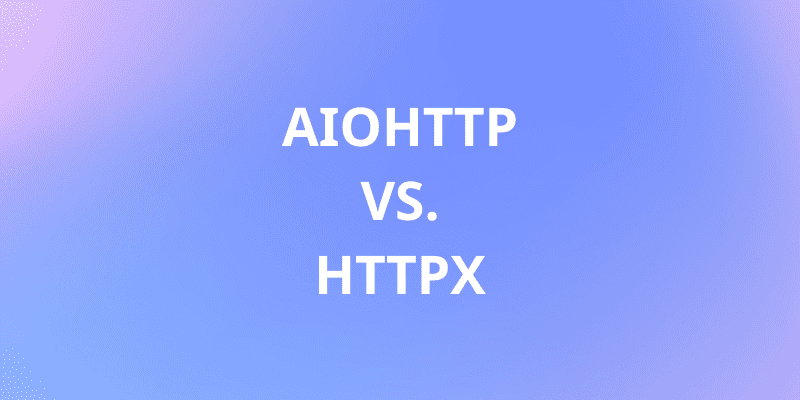When it comes to handling HTTP requests in Python, two libraries stand out: HTTPX and AIOHTTP. These libraries provide asynchronous support for making HTTP requests and offer a variety of features. But which one is better suited for your needs? In this article, we will compare HTTPX vs. AIOHTTP, explore their features, differences, and use cases to help you make an informed decision.
What is HTTPX?
HTTPX is a modern, fast, and highly capable HTTP client for Python. It is designed for both synchronous and asynchronous programming and aims to provide a clean API for HTTP requests. HTTPX supports HTTP/1, HTTP/2, and WebSockets, making it versatile and ready for the future of web protocols.
What is AIOHTTP?
AIOHTTP is another powerful library for making asynchronous HTTP requests in Python. It provides both a client and server-side implementation, enabling you to create HTTP servers and clients in a non-blocking way. AIOHTTP is highly regarded for its integration with Python’s asyncio framework, which is essential for building efficient, scalable, and fast applications.
HTTPX vs. AIOHTTP: Key Features
1. Asynchronous Support
Both HTTPX and AIOHTTP offer asynchronous functionality, allowing you to make non-blocking HTTP requests.
- HTTPX: Supports asynchronous requests through Python’s asyncio library. You can use async with to send multiple requests concurrently.
- AIOHTTP: Built specifically with asyncio in mind, AIOHTTP is designed for handling multiple concurrent requests efficiently using async/await syntax.
Both libraries excel in asynchronous programming, but AIOHTTP is more deeply integrated into the asyncio ecosystem.
2. Synchronous Support
- HTTPX: Supports both synchronous and asynchronous requests. You can use it in a synchronous environment if required, making it a versatile choice.
- AIOHTTP: Primarily focuses on asynchronous usage. While it supports synchronous requests, it’s not its main strength.
If you need synchronous functionality alongside asynchronous support, HTTPX is the better option.
3. HTTP/2 and HTTP/1 Support
- HTTPX: Fully supports HTTP/2, which can provide better performance, especially for making many requests simultaneously. This is a significant advantage for modern web applications.
- AIOHTTP: Supports only HTTP/1.1. While this is still widely used, it doesn’t offer the advanced features and speed improvements that HTTP/2 provides.
If HTTP/2 support is critical for your application, HTTPX is the clear winner.
4. WebSockets Support
- HTTPX: Provides support for WebSockets, which is useful for real-time communication between the client and server.
- AIOHTTP: Also provides excellent WebSocket support, allowing you to implement real-time features in your applications.
Both libraries provide WebSocket support, but AIOHTTP is more often used in server-side applications where WebSockets are common.
5. API Design and Ease of Use
- HTTPX: The API design of HTTPX is modern, clean, and intuitive. It allows developers to write clear and concise code, which is helpful for fast development.
- AIOHTTP: While AIOHTTP’s API is also well-designed, it can sometimes be more complex due to its deeper integration with asyncio and its focus on both client and server-side functionality.
For simplicity and ease of use, HTTPX has a slight edge, especially if you’re only dealing with HTTP client functionality.
HTTPX vs. AIOHTTP: Performance Comparison
In terms of performance, both libraries perform exceptionally well in handling asynchronous requests. However, there are some key differences:
- HTTPX tends to have a slight edge when dealing with HTTP/2, as it can handle concurrent requests more efficiently.
- AIOHTTP is faster when dealing with pure asyncio server applications but might lag behind HTTPX in scenarios where HTTP/2 support is needed.
Overall, HTTPX provides better performance in modern web applications that rely on HTTP/2.
When to Use HTTPX?
- If you need support for both synchronous and asynchronous requests.
- If HTTP/2 support is critical for your application.
- If you are looking for a modern API and an easy-to-use HTTP client.
- If you plan to use WebSockets alongside HTTP requests.
HTTPX is a great choice for developers who need both synchronous and asynchronous functionality and want to work with modern web protocols.
When to Use AIOHTTP?
- If you’re building an asynchronous server using Python’s asyncio library.
- If your project requires WebSockets for real-time communication.
- If you are working on a project where asynchronous HTTP requests are a core part of the architecture.
AIOHTTP is a good fit for server-side applications that require real-time communication or are highly reliant on asyncio.
HTTPX vs. AIOHTTP: Which One to Choose?
Ultimately, the choice between HTTPX vs. AIOHTTP depends on your specific use case:
- Choose HTTPX if you need an HTTP client that supports both synchronous and asynchronous requests, HTTP/2, and WebSockets.
- Choose AIOHTTP if you need a powerful asynchronous server framework that integrates seamlessly with asyncio.
Both libraries are excellent, but HTTPX offers more flexibility for developers working with HTTP clients, while AIOHTTP is better for building asynchronous servers.
Conclusion
In the debate of HTTPX vs. AIOHTTP, both libraries offer powerful features for making HTTP requests in Python. HTTPX stands out for its support for both synchronous and asynchronous operations, along with its HTTP/2 support. AIOHTTP, on the other hand, is ideal for building server-side applications with asyncio. Consider your project’s requirements to determine the best fit.
FAQs
1. What is the main difference between HTTPX and AIOHTTP?
The main difference is that HTTPX supports both synchronous and asynchronous requests, while AIOHTTP is mainly focused on asynchronous requests and is ideal for server-side applications.
2. Does HTTPX support HTTP/2?
Yes, HTTPX fully supports HTTP/2, which offers improved performance for making multiple requests simultaneously.
3. Is AIOHTTP only for asynchronous servers?
No, AIOHTTP can also be used as an HTTP client, but it is mainly designed for building asynchronous servers.
4. Can I use WebSockets with HTTPX?
Yes, HTTPX supports WebSockets, allowing real-time communication between clients and servers.
5. Which library is better for handling real-time applications?
Both libraries handle real-time applications well, but AIOHTTP is typically favored for building asynchronous servers with WebSockets. However, HTTPX can be a great option for HTTP clients in real-time applications.

